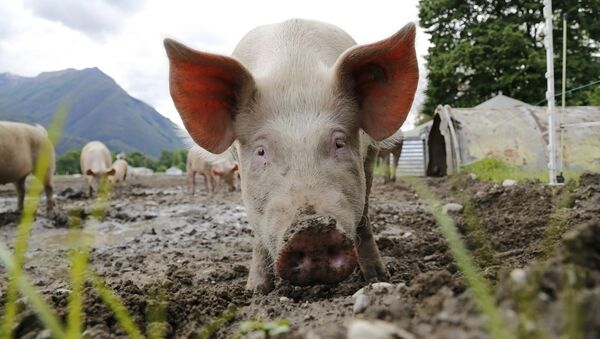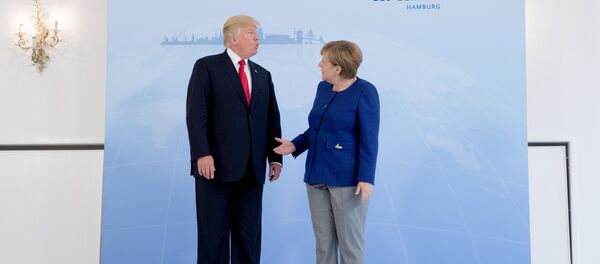Bilateral Swine (Fever) Squabble
In January 2014, Russia banned imports of live pigs and pork from the EU due to outbreaks of the African Swine Fever Virus (ASFV) in Lithuania and Poland.
Contributor Natalya Dembinskaya wrote in this vein in her article for Sputnik that the ban further damaged the interests of European farmers who were already feeling the impact of Russian counter-sanctions at the time.
READ MORE: EU Sanctions Against Russia Senseless — Italian Interior Minister Salvini
Brussels appealed against the restrictions which were described by the World Trade Organization (WTO) as illegal in December 2017, when the WTO warned Russia against completely banning pork imports because of the ASFV.
After the Russian state agriculture watchdog Rosselkhoznadzor lifted all relevant veterinary and sanitary restrictions in late 2017, and deliveries of live pigs from EU countries resumed in January 2018.
"But, of course, in smaller volumes as compared to those that were in place seven years ago, something that can be explained by increasing pork production in Russia," Dembinskaya cited Yuri Kovalev, director general of the National Pig Production Union, as saying.
Don' buy that pig in a poke!
In a move towards full compliance with the WTO decision, Russia opened its market up exclusively for live pigs, in a move that is in line with Russia's push for developing its live-stock sector.
READ MORE: Russia Blocks EU's Request to Establish WTO Arbitration Panel on Pork Dispute
In the next three to four years, Russian plans to commission capacity for the production of about one million tons of pigs in live weight, something that stipulates more breeding pigs, according to the National Meat Association.
"As for the pork, it came under the food embargo in August 2014. The ban, which is still in force today, remains a real headache for the European Union," Dembinskaya pointed out.
In this regard, she added, Brussels perceives the WTO, which has long been turned into an instrument of political struggle, as an appropriate instrument to pressurize Russia.
Hog Heaven or Hell?
Market participants believe that even though the supply of pork will not be resumed in the near future, this will not affect the Russian market given that restrictive measures added to the development of Russia's own pork production.
"Poultry and pork on Russian store shelves are 95 percent domestically made. Production is growing at such a rapid pace that it leaves little room for import," Dembinskaya noted.
According to the Federal Customs Service, in the first six months of 2018 Russia's meat imports declined 1.7 times against the same period last year, excluding supplies from the Eurasian Economic Union (EEU) countries.
Imports of pork decreased 36.3 thousand tons against 147.7 thousand tons a year earlier, in what became the most significant decline in the sector.
Breaking the Piggy Bank
Dembinskaya cited economists as saying that by imposing a pork embargo, Russia hit the most vulnerable sectors of the European economy.
Even an embargo on steel would not lead to such serious losses for the EU as restrictions on food imports because this market in Europe is oversupplied, according to Dembinskaya.
READ MORE: Idea of Russia-EU Free Trade Area 'Still Appealing' — Lower Saxony's PM
She cited Dmitry Zhuravlev, head of the Moscow-based Institute of Regional Problem think tank, as saying that quotas for agricultural production in the European Union are a "very painful topic."
"Grants to agricultural producers remain a key item of expenditures of the European budget. The EU pays to its farmers to make them produce less," said Zhuravlev.
Dembinskaya concluded by saying that in an attempt to enter the Russian market by all means, "the Europeans are knocking on different doors, including that of the WTO."
"On the other hand, Europe should not count on concessions from Russia. Moscow has a strong position and weighty arguments, while disputes in the WTO can last for years and even decades," she underscored.
The views and opinions expressed by Natalya Dembinskaya are those of the contributor and do not necessarily reflect those of Sputnik.


